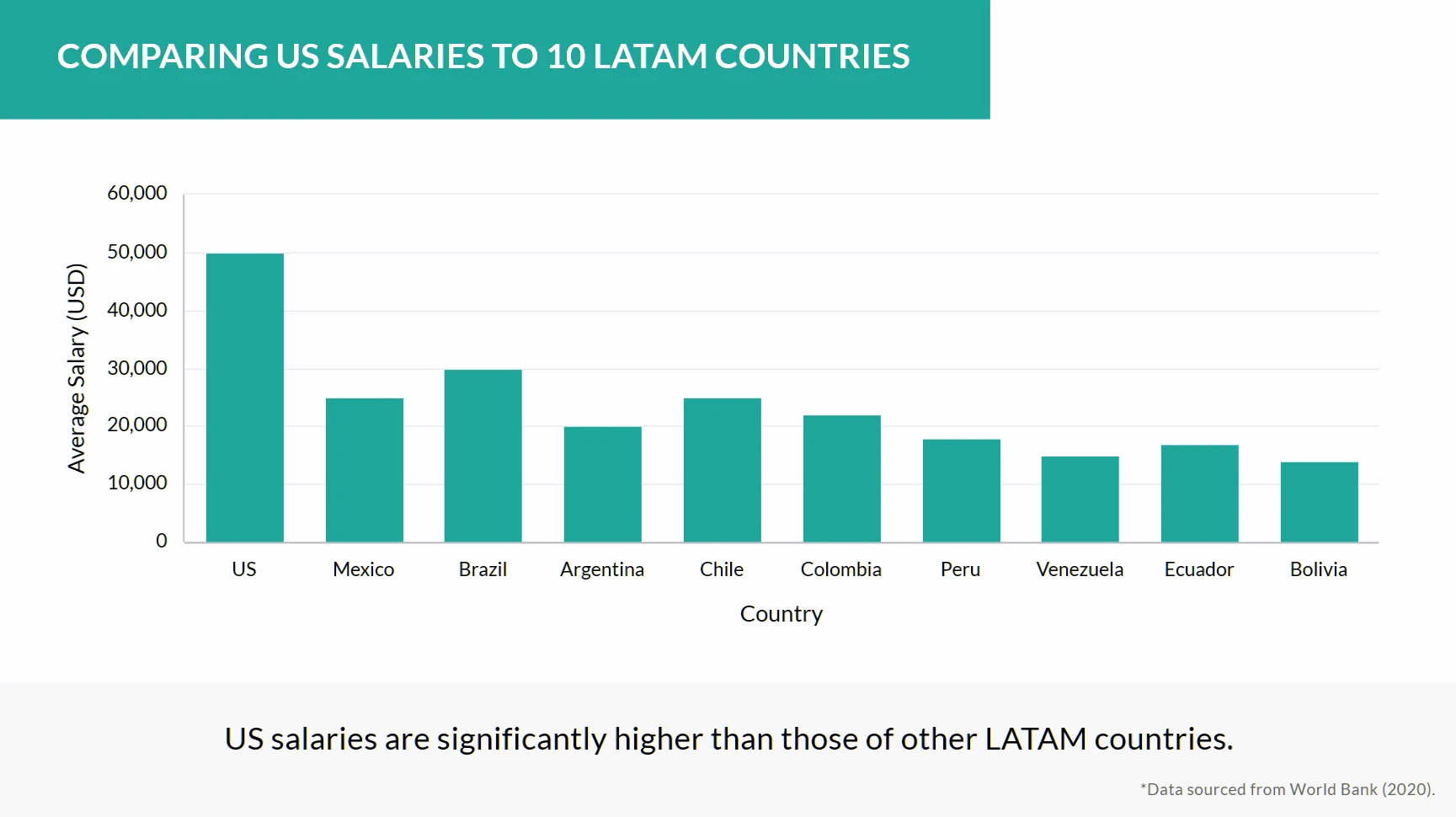An increasing number of U.S. companies outsourcing to Latin America to begin tapping into their rich talent pool. With factors like time zone compatibility, cost-effectiveness, and a highly skilled workforce playing a key role, this emerging trend is reshaping the traditional boundaries of business operations.
Whether you’re a business leader considering outsourcing or simply keen to understand this growing trend, this article will cover the top 10 roles that are currently trending in the LATAM region.
Why Outsource to Latin America (LATAM)?
Outsourcing has transformed from being just a cost-saving strategy into a key component of growth and competitiveness.
Latin America has been rapidly rising in popularity as an outsourcing destination for U.S. companies, thanks to a combination of compelling factors:
- Time Zone Compatibility: Latin America’s time zones closely align with those in the U.S., enabling real-time collaboration and effective communication, thereby overcoming some of the most common challenges associated with outsourcing.
- Talented Workforce: The region boasts a robust talent pool that is recognized for its high level of technical proficiency, multilingual capabilities, and diversity of skills to cater to a wide array of industry needs.
- Cost-effectiveness: Outsourcing to Latin America can provide significant cost savings without compromising on quality, making it an attractive option for businesses looking to optimize their resources.
- Cultural Affinity: The cultural similarities between the U.S. and Latin America can result in smoother communication and better understanding, leading to more efficient and productive business relationships.
10 Job Roles Ideal for Outsourcing to Latin America
Here are the top 10 job roles most frequently outsourced to Latin America. Covering various fields, this list reflects the breadth of skills available in the region. For each role, we’ll outline its nature, explain its outsourcing appeal, and compare salaries between the U.S. and Latin America.
| Job Role | Average US Salary | Average LATAM Salary Range |
| Software Development | $114,583 | $30,000 – $50,000 |
| Customer Service | $59,442 | $10,000 – $15,000 |
| Graphic Design | $55,537 | $15,000 – $25,000 |
| Data Analysis | $74,968 | $20,000 – $30,000 |
| Digital Marketing | $92,907 | $15,000 – $25,000 |
| IT Support | $50,100 | $10,000 – $20,000 |
| Accounting | $61,662 | $15,000 – $25,000 |
| Mobile App Development | $135,925 | $20,000 – $35,000 |
| Social Media Management | $56,848 | $10,000 – $20,000 |
| Inside Sales Representative | $57,184 | $15,000 – $30,000 |
Let’s examine these roles in more detail.
1. Software Development
Software Development has emerged as one of the top roles outsourced to Latin America. This field involves creating, testing, and maintaining software applications to meet the specific needs of users or systems. The region’s strong emphasis on STEM education has resulted in a large pool of highly skilled software developers. Additionally, the nearshore advantage allows for real-time collaboration with U.S. teams, reducing the friction often associated with offshore development. When it comes to salaries, software developers in Latin America typically earn less than their U.S. counterparts. For instance, the average base salary for a software developer in the U.S. is at $114,583, while in Latin America, it could be about $30,000 to $50,000, depending on the country and level of experience. This significant cost saving, coupled with the high quality of work, makes software development a prime candidate for outsourcing to Latin America.
2. Customer Service
Customer Service has long been a core function outsourced by U.S. companies, and Latin America is proving to be an increasingly popular choice for this role, especially in Mexico. The customer service sector involves direct interaction with customers, providing assistance, resolving queries, and ensuring a high level of customer satisfaction. Latin America’s cultural closeness to the U.S. plays a significant role here, as it helps in maintaining a superior level of service that understands and respects the customers’ perspectives. Furthermore, the multilingual capabilities of the Latin American workforce are a distinct advantage in this role, particularly for businesses serving a diverse customer base. In terms of salary comparison, a customer service representative in the U.S. may earn an average of $59,442 per year, while their counterpart in Latin America might earn between $10,000 to $15,000, depending on the country and level of expertise. The combination of cost savings, cultural compatibility, and language skills make customer service an ideal role for outsourcing to Latin America.
3. Graphic Design
Graphic Design is a creative field that involves creating visual content to communicate messages. By understanding the needs of their clients, graphic designers use typography, images, color, and layout to create designs that capture attention and drive engagement. Latin America, with its rich cultural heritage and history of visual arts, has a thriving graphic design scene. Many U.S. companies are tapping into this creative pool to bring a fresh perspective to their visual content. The ability to work in similar time zones also allows for smoother project coordination and real-time feedback. In terms of salary, a graphic designer in the U.S. might earn an average of $55,537 per year, while a designer in Latin America could earn between $15,000 to $25,000, depending on the country and the level of expertise. The combination of cost-effectiveness, creative talent, and ease of collaboration makes graphic design a highly sought-after role for outsourcing to Latin America.
4. Data Analysis
Data Analysis is an increasingly vital function for companies looking to make informed, data-driven decisions. It involves processing and interpreting complex datasets to uncover trends, draw conclusions, and drive strategic initiatives. Latin America has become a go-to destination for outsourcing this role, thanks to the region’s strong educational focus on mathematics, statistics, and related disciplines. The ability to collaborate in real-time due to the convenient time zone alignment further facilitates clear communication and quick turnaround times on data-driven projects. In terms of salary, a data analyst in the U.S. might earn an average of $74,968 per year, whereas their counterpart in Latin America could earn between $20,000 to $30,000, depending on the country and level of expertise. The blend of cost savings, strong analytical skills, and seamless collaboration makes data analysis a compelling role for outsourcing to Latin America.
5. Digital Marketing
Digital Marketing is a critical role that revolves around leveraging digital channels to reach prospective customers, build brand awareness, and drive sales. The field includes search engine optimization, social media marketing, email marketing, content marketing, and more. Latin America has seen a surge in digital marketing talent, fueled by the region’s high internet penetration and a young, tech-savvy population. The cultural proximity to the U.S. market allows Latin American digital marketers to craft messages that resonate with American audiences. Furthermore, the similar time zones enable real-time communication, making campaign coordination and adjustments more efficient. In terms of salary, a digital marketer in the U.S. might earn an average of $92,907 per year, while their counterpart in Latin America could earn between $15,000 to $25,000, depending on the country and level of expertise. The combination of cost savings, cultural understanding, and digital savviness makes digital marketing a popular role for outsourcing to Latin America.
6. IT Support
IT Support is a crucial role that ensures the smooth running of computer systems within an organization. This role involves resolving technical issues, maintaining hardware and software, and providing technical assistance to users. With the increasing adoption of technology in Latin America, the region has developed a robust IT infrastructure and a pool of skilled IT support professionals. The similar time zones with the U.S. make real-time support possible, minimizing downtime and enhancing productivity. In terms of salary, an IT support specialist in the U.S. might earn an average of $50,100 per year, while their counterpart in Latin America could earn between $10,000 to $20,000, depending on the country and level of expertise. The blend of cost savings, technical proficiency, and real-time support makes IT support a valuable role for outsourcing to Latin America.
7. Accounting
Accounting is a fundamental role that involves managing a company’s financial records, preparing reports, and ensuring compliance with regulatory standards. Latin America has become a sought-after destination for outsourcing this role, thanks to its well-established educational system in business and finance disciplines. The region’s professionals are well-versed in international accounting standards, making them a valuable asset for U.S. businesses. The alignment in time zones further facilitates seamless communication and prompt resolution of any issues. In terms of salary, an accountant in the U.S. might earn an average of $61,662 per year, while their counterpart in Latin America could earn between $15,000 to $25,000, depending on the country and level of expertise. The combination of cost-effectiveness, expertise in accounting, and ease of communication makes accounting a desirable role for outsourcing to Latin America.
8. Mobile App Development
Mobile App Development is a rapidly growing field that involves creating software applications for use on mobile devices. Latin America, with its burgeoning tech scene, has become a hotbed for talented app developers well-versed in popular platforms like iOS and Android. The region’s tech-savvy workforce, combined with their cultural affinity to the U.S., allows for the development of apps that are both technically sound and culturally relevant for American audiences. The similar time zones also allow for real-time collaboration, speeding up the development process. In terms of salary, a mobile app developer in the U.S. might earn an average of $135,925 per year, while their counterpart in Latin America could earn between $20,000 to $35,000, depending on the country and level of expertise. The blend of cost savings, technical skills, and cultural understanding makes mobile app development an in-demand role for outsourcing to Latin America.
9. Social Media Management
Social Media Management involves overseeing and directing a company’s social media activities. This can include content creation, community engagement, audience growth, and tracking performance analytics. With the global nature of social media and the need for round-the-clock engagement, outsourcing this role to Latin America has become an attractive option for many U.S. companies. Latin America’s familiarity with U.S. culture, high English proficiency, and creative talents make its workforce adept at crafting engaging content and managing online communities. The time zone compatibility also enables faster responses to customer interactions, enhancing brand presence and customer satisfaction. In terms of salary, a social media manager in the U.S. might earn an average of $56,848 per year, while their counterpart in Latin America could earn between $10,000 to $20,000, depending on the country and level of expertise. This cost-effectiveness, combined with adept social media skills, makes this role a popular choice for outsourcing to Latin America.
10: Inside Sales Representative
Inside Sales Representative is a pivotal role that involves selling products or services over the phone or through online means. The role requires a deep understanding of the company’s offerings, excellent communication skills, and the ability to build strong customer relationships. Latin America has become an increasingly popular destination for outsourcing this role, due to the region’s high level of English proficiency and cultural affinity with the U.S. market. This allows for a smoother sales process, as representatives can effectively communicate the value proposition and handle customer objections. The similar time zones also facilitate real-time communication with potential customers during prime business hours. In terms of salary, an inside sales representative in the U.S. might earn an average of $57,184 per year, while their counterpart in Latin America could earn between $15,000 to $30,000, depending on the country and level of expertise. The blend of cost savings, language proficiency, and understanding of sales dynamics make inside sales a highly sought-after role for outsourcing to Latin America.
How to Get Started Outsourcing to LATAM
Partnering with a nearshore outsourcing company, like 1840 & Company, enables businesses to seamlessly integrate Latin American talent into their operations. Our extensive experience in outsourcing and staff augmentation services across LATAM ensures that businesses can find, hire, and manage remote talent effectively. With a deep understanding of the local labor markets, regulatory landscapes, and cultural nuances, we help quickly match U.S. businesses with skilled professionals. If you’re looking to outsource to LATAM, schedule a call with our growth experts to learn more!
DID YOU KNOW? Incorporating Latin American talent into your workforce strategy not only drives down operational costs but also enhances your company’s agility and global reach. It allows for round-the-clock operations and brings fresh perspectives into your business strategies, fostering innovation and competitiveness in a rapidly changing market.
Final Thoughts
In a world where digital connectivity is the norm, geographic boundaries no longer limit a company’s ability to find the best talent. Outsourcing to Latin America has emerged as a strategic move for U.S. companies looking to tap into a pool of skilled professionals while also reaping significant cost benefits. From software development to customer service, the diverse and talented workforce of Latin America is helping U.S. businesses scale and thrive. The ten roles we’ve explored in this article are just the tip of the iceberg when it comes to the potential of Latin American talent. As the region continues to grow and develop, it promises to be a hotspot for outsourcing, making it an essential part of any company’s global talent strategy.





